- Home
- Adam Thorpe
Hodd Page 22
Hodd Read online
Page 22
Thus we waited instead in the town, and lest any from the castle should be there, I played the harp in the market place, while Littl John sat by me to take the offerings of coin or bread, and to guard me from the taunts and japes of other boys, and malicious folk.
It was indeed difficult to keep my eyes closed as though blind, and most frightening: for (unconjoined to vision) the sounds of the city seemed very loud and hellish; being all a confusion of cries and creakings and the clamour of ambling hooves, and occasional clashings of irons, and the moans of oxen, and many an iron-shod wheel on stone, and the ringing of great bells, and dogs barking and sheep bleating and pigs [snorting] and birds warbling,335 upon which was laid much incessant chattering of passers-by, yet all so incoherent [sibi non constans], that I did think I was going mad.
And yet my harp was piercing this tumult, as was my high and melodious voice, I know not how; and though my fingers began to bleed, I continued to pluck the strings, forcing sweet songs out of the murthered boy’s instrument. Guilt raged so horribly in my heart, that it was turned into hate by the demons within, as oft occurs. I began to despise the boy I had slain, that he had made me suffer so; I told myself he was truly the favourite of a Judas (that being my former master): and as I sang I recalled all the slights suffered by me at my master’s hands in the monastery, and how his affection had cooled, and what he had said of me to Henrie, and that I was only a lowly servant to him after all.
Thus even the best milk curdles. Worse still – though it pains me to the bone to utter such a truth thereof – I felt a pride and even a strange thriving in the violation of the most precious vow and commandment;336 for the devils within were puffing upon my sinfulness and making its stink rise thicker, turning its smoke to that of incense with their trickery, and filling my brain with satisfaction. All this [did I feel] as I mimicked a blind harper near the great church, nodding solemnly at the pity and compassion shown to me in the words of those passing by – especially the young and tender-hearted women, whose dulcet voices were a vehement temptation to open my eyes and regard their beauty, for their speaking was so delectable that I could not imagine their faces being otherwise than lovely.
And thus even carnal love was added to the brew, as I sang sweetly of brave knights and their damsels – as I once did likewise in street and market place several years before, when a small and lonely and foolish runaway of but nine or ten.
Meanwhile, my brute companion in evil invented the reason for my blindness – when folk asked him thereof – that was so piteous to relate, I marvelled at his wit; for he told how robbers attacked and strangled his beloved wife when I (their dear and only child) was yet six or seven; and that too much weeping while praying for her soul, lost me mine eyes.
How easy is it to lie and invent, and fool others for gain in this dismal world! Better be the man or woman, who keeps their soul shut up straitly in a holy house of thick walls, and their lips likewise but for chanting the scriptures, that no shrewd, adulterine words weave their loathsome patterns in others’ ears …
This spasm of righteous polemic lasting a full two leaves, with many scriptural citations and a digression in which heretics, Israelites and the followers of Mahomet are equally hotly pursued, I have omitted most of it and taken the opportunity to make a natural pause; what is more, the author then takes a characteristic jump backwards to the time of the hermitage, before resuming the narrative proper.
Part Four
1
I once knew an honest, poor and worthy woman in my childhood village, who in old age was severely bent, and her left arm so crooked that it no longer had feeling: which was surely a sign of true virtue, that she could do no wrong, for the Devil loves the left side. Similarly, those struck dumb are removed from one great source of sin, while the deaf are free from blandishments and evil persuasions of others. The wretched blind, however, deem white as black, and black as white; west as east, and silver as copper, and ayenward the same.337
Thus groping and grasping, he may be led astray or fooled, and so his situation is the most wretched. And what if we are all inwardly blind, whether our eyes are sighted or no? Then we can only wait (perchance it never comes!) for the scales to fall away, and be lit up from within by a certain knowledge of truth and falsehood; thereby the Devil can no longer play with us as our boy or hound, leading us sightless to the fatal bridge and leaving us there upon the brink.
Those who confuse light with colour – the one being pure, the other (though desired in its natural form, or in the sacred adornment of our churches) prey to all manner of deceit, as foulness be hidden by lurid raiments, or blemishes and malignant boils by tinctures and paste – confuse also God and His ministers; for even the holiest among the latter may be the Arch-fiend in disguise, whereas God can be no other. Think then, how shrewd a man must be to distinguish good from evil in these cheating times, save he be aided by prayer, worship, or divine intervention. How much less skilled was I in those days, being merely an orphan youth, of a boyish levity! Look at me there, acting the sightless harper in the market place, wringing false pity out of good hearts (that pity, honestly minted, being clipped by my forgery of blindness). See my fingers, seethed in a boy’s blood, yet plucking the fox-gut melodiously! Do I not seem the very picture of solemn fortitude and patient virtue?
Had I not refused, many years before, the holiest man I have ever known? Had I not cheated him, and stolen from him, in the vain belief that not only had he let a man perish in a storm, but also myself (his own pupil) to be half stifled e’en to a similar fate among those salty, liquid hills: this belief lending a justice to my actions?
God vouchsafe me His mercy! For while the blotless man was replenishing his jug with water, I seized his precious harp and fled with it, not once looking back e’en from the top of the cliff.
And so I tore myself mercilessly from the hermit my first master, to become a vagabond, full of false dreams of the minstrel life, and of great palaces and courts in which I might play and make all merry.
There was I certainly and most powerfully blinded, against which my semblance of blindness be naught! And now upon the threshold of the eternal judgement, on the very sill of doom, I see how at that moment of rash theft and escape, I was torn from the bowels of my faith and of God’s grace, and am now utterly resigned to His infinite compassion, as likewise to His awful wrath that may gush uncontrollably338 from His hatred of my youth’s dreadful sins. Though it be as horribly fearful to anticipate the blistering flame and eternally boiling pitch in the dark place ringing with shrieks and wailings and screams, as it is sweetly gladsome to be touched (in prayer, or sometime on a spring morning along the garden paths) by the balm of Heaven and of spiritual joy, I do not attempt to peer beyond death, and descry my fate, however imminent: for I am no sorcerer or necromancer gripped by unbelief.
See how swiftly I flee upon the path – as though chased by an angelic host, grieving for that divine instrument – to my foster-mother in the village! Those hairy arms of hers I had come to detest, for she had used them to chide me with blows in recent months, and I left her with no more than a lie: that I must work in the lord’s field, to salvage the corn. Well I remember the look she gave me, of maternal solicitude, for she was a good and loving woman behind her crooked back and hairiness, and wanted only the best for her foster-son, being therefore glad I was already doing labour services [opem]339 at such a tender age (I was, as I have said, no more than nine or ten), and not wasting my limbs upon words.
Having concealed the hermit’s harp in a thicket near my buried coins, I retrieved both, carrying the former upon my back in its own leathern sack shaped like a wing, and the latter under my leathern belt. Foul was it on the ways, the storm having been a fierce one, and it had done much damage to the crops. And those country folk I passed for the first [few] miles did know me and some did care for me as an orphan boy, however simple their faith and their lives bare of all graces, and oft untrue one to another in their envy and povert
y, and as heedless of their incontinence as beasts; yet I threw them only deceit, as scraps to dogs.
And now was I all deceit, from my toes up, even to myself: for I had in mind to find a manor house, where I would be adopted as the lord’s minstrel, and from thence be delivered to the king, and live in his palaces, and one day to accompany him under the royal standard to the Holy Land, and other fabulations that seethed in my mind as I trudged upon the muddy ways; for I had been thoroughly perverted by the royal progress, and most especially its pale, mincing courtiers in their extravagant sleeves and coats and shoes, who listened to me with such praise in their haughty, yet softly-smiling faces.
Alack, what bliss coursed through my brain as I painted my future! And what despair soon followed (like the foulness in the sewers left by a feast), when hunger and poverty were joined by bruises laid upon me by drunken rascals upon the way, or the blows of those finding me sleeping in their barn or outhouse, however fierce the rain: for there is little compassion in the world, and less even now than then. Sometimes my music pleased, inflaming simple country folk to dance (instead of listen), which dances are believed by many great teachers to be a vanity invented by Satan, who always leads [the dancers] according to those holy enough to descry him.
I thereby received bread and scraps of meat, but so full of trickery is the world, that most took me for a thief’s accomplice, selling music as a lure to make them distracted, while robbery took place. Just as butchers sell sodden meat, or quacks mislead us with worthless herbs, or bakers fold sawdust in their oaten flour, so did I seem. For I was too young, folk thought, to be all alone and not a beggar or a vagabond.
The keenness of winter can be felt in autumn winds, and e’en more so when thy flesh is scarce upon the bone: for swiftly, swifter than I could have imagined, did hunger and cold weaken me, and my poor clothing grow ragged and soiled, and the rain beat down upon my houseless head. Fallen Nature’s frivolous cruelty and indecency [turpitudo], covered o’er in the summer-season with pretty flourishings, is so great that ’tis no wonder she appears to take the Devil’s party, kindled by pagan sorcerers and lechers in their secret rituals, and by lewd and ignorant peasant dances in the open fields.340
One question began to trouble me, in my wanderer’s feverishness: if the sky’s blue be that of a girdling sea, then why is rain not salty to the taste when it falls on the tongue, when it drives against the mouth? I asked my holy master this question in turn, for I saw him in my madness of dreams, and he told me without moving his lips, as a dead man might speak in our minds, that at some point in its curving up into sky at the edge of the world (which men call the Antipodes), where mist obscures from the ascending mariners their upward movement into an element that remains air, but is lighter than the air we know down below, the water loses its saltiness. ‘For salt is swiftly dried into crystals,’ I heard him say (as though the sea-cave had become my own skull), ‘and is therefore heavier than the liquid it floats in, and must perforce drop away, unable to ascend as swiftly, leaving only fresh water around the boat as it sails above or alongside the towering cliffs of fog, that we call clouds.’
Many times since have I considered such things, even through the mutter of my reading, marking my place in the book with a straw and furrowing my brow in the sudden [silence]. Crouched half-frozen on the outer seats of the cloister winter after winter, I have oft put my goosefeather down to stamp a meagre warmth back into my limbs, letting my thoughts circle around and about as I pace the familiar flagstones. And e’en now, past my ninetieth year (truly, it seems I am condemned to this mortal life for eternity), my body shuffles in its servitude, in poor imitation of its former habit.
Yet it never suffices, for the holy man’s voice no longer sounds in my head. I am gnawed by lack of knowledge, as my fingers are scabbed by this very scratching pen. I am no nearer knowing why tears are salty, of the same taste as the sea, or why rain is not. All I do know is that God made such things that we may live to praise His works, for if rain were salty it would render streams and rivers and lakes unpalatable, and mankind would die of thirst. For no man can survive by drinking his own tears, however craving of water he be, or sorrowful; though through that wandering time I oft was forced to, for my suffering made them fall very thick and fast.
Few helped me, though I was but a child of nine or ten. Meeting with wayfaring ruffians and dubious idlers – of the type that go forth on false pilgrimages and exact alms, or don a false hermit’s garb at bridges and fords (and sit all day, so forslothen are they) – I knew not whom to trust. One villain, blinded by a red-hot brand for thieving boots, wished me to be his guide, and robbed an inn of its linen while I sung there (for he was no more blind than myself). And when the robbery was discovered, I was seized and almost hanged on the spot, with only my honest tears and bewilderment saving me from death.
Many were the times I thought my harp would be taken from me, and I retreated to the blear wastes at night, rather than sleep among habitations, e’en when my playing had earned me shelter. Only when I passed a holy house of brothers, or a nunnery, was I certain of a roof – but even then there were vagabonds and vicious types that I was fearful to sleep among, however soft the rushes upon the floor.
A troupe of jougleurs [joculatores] and masked players, admiring such skill in one so young (for all the weakness of my piping voice), at first proffered me to accompany them on their travels; and glad of company, I did so: and our minstrelsy of music and jesting was heartily loved by both common folk and nobles. But these play-actors, being utterly forsworn to their ways of drunkenness and lechery, so disgusted my childish soul (despite their kindness and wit), that I finally fled them.
This came about as follows: we entertained at a lord’s feast, in a rich manor near Chesster, and the ladies smiled at me, rustling about me in their brocaded silks e’en as the actors shrieked and tumbled. Afterwards we slept in the hall among the scraps, and a dog bit me on the ear, and I saw of what baseness were these lords and ladies, for they snored drunkenly in their beds as loudly as the minstrels sprawled on the floor;341 and the next morning those same beauteous ladies had turned to ill-tempered ogresses, their hearts no better than the stinking manure of the courtyard, wherein all the filth of that fine house did drain.
I still had the hermit’s goodness within me, that railed against these loose practices of adulthood – which transgressions are less hidden from a masterless and orphaned child without a home. In Yorke, where the glorious minster was being made even vaster, and all was scaffolding of a giddying height that groaned and bent with so many men upon it, I found piecemeal work with the stone-layers and wallers and rammers; handing them their gear and tools, or guarding the windlass, and busying myself on my small legs – cheered to it and also cursed sometimes by these labouring artisans. Yet was I cheated of my payment, for I had no licence, and left that place indignant and chastened, my throat sore with white dust.
Once also in Du[r]ham, shrine of holy St Cuthbert, where the abbey church sheltering his sacred tomb was already old342 (and of such colourful immensity within that no eye had ever seen the like), I joined a company of malefactors disguised as tumblers. Two mighty and wondrous towers were being added to the church, upon whose amplitude of sandstone [tofus] the workmen were like chattering ants; and we enacted the story of holy St Cuthbert in mime and antics, to the crowds come to gaze upon this mighty labour, while others of us cut their purses. I played the archangel Mikhel, with a silvered face and my harp plucked by my silvered hands, whom the other buffoons pretended they could not look upon without foolish yelps and cries, so blinding was my divine light: no greater hypocrisy is possible, alas, and I blush to think of it e’en now, feeling the sword of the true St Myhel pierce my bowels with cramp.
Forbidden, under threat of mutilation, to play this knavish buffoonery before that holy wonder, we roamed through many a market or fair, fifteen or twenty strong, thieving and rifling, and none dared oppose us – for we had surety [sponsionem] of a po
werful lord343 nearby. I did this only because I was nigh starving, yet follows well the punishment after; a mad, foaming dog being loosed upon us as we slept, many were bit before I fled that sanguinary place for good, without a scratch.
After months of this savage life, I grew too weak to sing, and soon I was truly begging. But at that time as now there were many beggars, for the [civil] war344 had been very fierce, and many crippled or masterless men roamed the ways. And one morning, seeing the poor coming from the woods under baskets laden with moss, yet talking to one another or whistling, I wished fervently to return to my village home, where I was known and cared for. But I was fearful to, for the harp’s value was very great and, thieved, would cause the culprit to be hanged for certain, unless the jury took pity upon a child. Even were I to bring back the instrument to its former blessed owner, falling on my knees in contrition, I feared the punishment would be harsh.
There came a day when I saw a lord’s stone manor on a hill, and plodded up to it and knocked weakly on the great door; I was chased from there forthwith, most uncharitably, with only a stump of dry loaf given to me by the servant, for there were swarms of children begging in that area – there being much want among the peasants, scarce recovered as they were from the wars, after the great storms. And on the path down, these meagre young creatures, with sores on their faces and unshod feet, took me in as one of their own.
Though they were urchins and rascals, and always hungry and filthy, these children were full of mirth and games, oft kicking any round thing to hand, and loving to climb trees and other perilous japes and exploits: and when stealing apples and pears from orchards, they took only those that were bruised and fallen, for the beating or whipping would be otherwise very severe. Yet I stayed not with them more than a few days, for when I played and sang, they wished me to teach them, and this I could not do without their soiled, greasy hands touching the strings, and much damage being risked thereby. Although the spirit of music entered them by the ears as it might a brute beast, soothing them and lifting them in wonder, their ragged state made me fearful of mine own; for whereas they would always be bridled by their servile condition,345 and bowed under till death, I considered myself released from peasanthood, and mercifully erect.

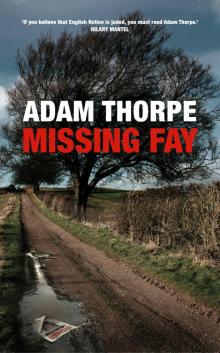 Missing Fay
Missing Fay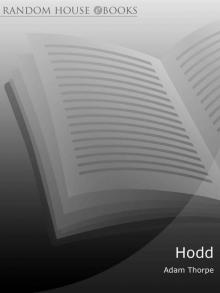 Hodd
Hodd Pieces of Light
Pieces of Light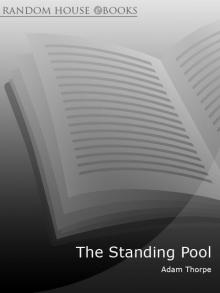 The Standing Pool
The Standing Pool Ulverton
Ulverton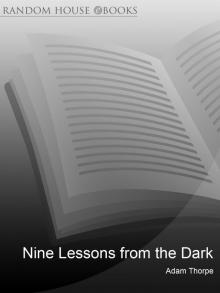 Nine Lessons From the Dark
Nine Lessons From the Dark Flight
Flight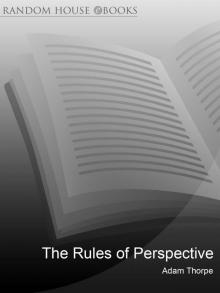 The Rules of Perspective
The Rules of Perspective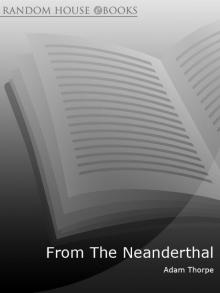 From the Neanderthal
From the Neanderthal Is This the Way You Said?
Is This the Way You Said?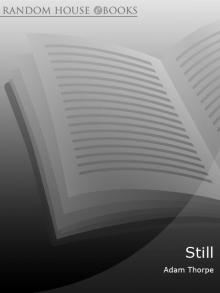 Still
Still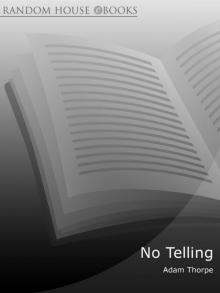 No Telling
No Telling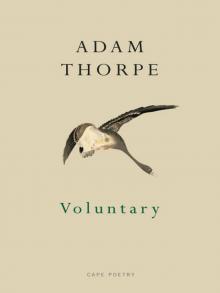 Voluntary
Voluntary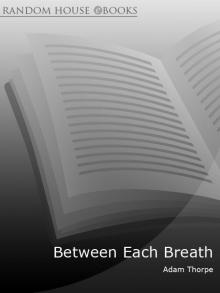 Between Each Breath
Between Each Breath